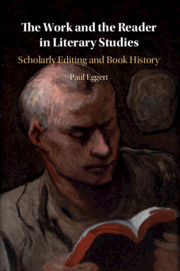Book contents
- The Work and the Reader in Literary Studies
- The Work and the Reader in Literary Studies
- Copyright page
- Dedication
- Contents
- Figures
- Preface
- Chapter 1 Introduction
- Chapter 2 Reviving the Work-Concept
- Chapter 3 The Digital Native Encounters the Printed Scholarly Edition Called Hamlet
- Chapter 4 The Reader-Oriented Scholarly Edition
- Chapter 5 Digital Editions
- Chapter 6 The Work, the Version and the Charles Harpur Critical Archive
- Chapter 7 Book History and Literary Study
- Chapter 8 Book History and Literary Study
- Chapter 9 Adaptation, Folklore and the Work
- Chapter 10 Conclusion
- Notes
- Bibliography
- Index
Chapter 7 - Book History and Literary Study
The Late Nineteenth Century and Rolf Boldrewood
Published online by Cambridge University Press: 19 August 2019
- The Work and the Reader in Literary Studies
- The Work and the Reader in Literary Studies
- Copyright page
- Dedication
- Contents
- Figures
- Preface
- Chapter 1 Introduction
- Chapter 2 Reviving the Work-Concept
- Chapter 3 The Digital Native Encounters the Printed Scholarly Edition Called Hamlet
- Chapter 4 The Reader-Oriented Scholarly Edition
- Chapter 5 Digital Editions
- Chapter 6 The Work, the Version and the Charles Harpur Critical Archive
- Chapter 7 Book History and Literary Study
- Chapter 8 Book History and Literary Study
- Chapter 9 Adaptation, Folklore and the Work
- Chapter 10 Conclusion
- Notes
- Bibliography
- Index
Summary
From the 1980s book history has insisted on the material object (rather than the work) as the object of study, together with the collecting and reading of it. Lacking so far has been a strong theoretical underpinning: conceptually tying materiality to the role of readers in a way that would simultaneously answer the central question for literary study broached in Chapter 1: What is the thing read?
Close reading – still the practical basis of literary training – offers no obvious answer. Since the New Criticism no viable defence of it has emerged. Caroline Levine’s 2015 book Forms offers an aesthetic-political formalism but fails to answer the central question.
A fresh definition of the work as regulative idea is put forward. By recognising the dialectically linked dimensions of document and textual meaning at every stage from genesis to production to reception, it incorporates the work’s versions and material forms together with their readers.
Stages of reception (and aesthetic reception in the present) may be studied as indices of the cultural shifts with which the work’s manifestations engage. Rolf Boldrewood’s Robbery Under Arms (1882–3) provides the case study.
Keywords
- Type
- Chapter
- Information
- The Work and the Reader in Literary StudiesScholarly Editing and Book History, pp. 108 - 130Publisher: Cambridge University PressPrint publication year: 2019

